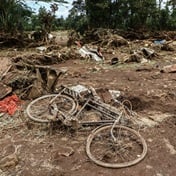- Food aid is stuck in transit, and many goods hard to find, after Niger's coup.
- Surrounding ECOWAS states banned trade with Niger.
- Fellow coup-led country Burkina Faso has kept its border open, but elsewhere smuggling is thriving.
Acute deprivation is endemic in Niger, one of the world's poorest nations. But West African sanctions aimed at forcing a return to democracy after a coup are making people's lives worse.
Food and medicines are scarce in the landlocked country, prices are skyrocketing and blackouts after regional powerhouse Nigeria cut its electricity supplies mean that factories are lying idle.
Earlier this month, the UN said 7 300 tons of food aid destined for Niger was stuck in transit because of border closures.
"Almost all prices have risen due to the sanctions," shopkeeper Elhadj Ali tells his customers defensively at the bustling Dar-es-Salaam market in the capital Niamey.
Regional bloc ECOWAS -- the Economic Community of West African States -- banned trade with Niger after rebel elite soldiers on 26 July overthrew Mohamed Bazoum, the democratically elected president.
Negotiations to restore civilian rule have yet to bear fruit, with the junta demanding a three-year transition and ECOWAS calling for Bazoum's immediate return.
Imported rice -- a national staple -- is way more expensive, with a 25-kilo bag now costing 14,500 CFA francs (about $25) against 11,500 CFA francs before the coup.
"For the moment there are no shortages and the prevailing stocks will see us through till December," said Chaibou Tchiombiano, general secretary of the main association of Nigerien exporters and importers.
But he warned that reduced rice imports from China and Thailand could eventually lead to shortfalls.
Medicines are also getting scarcer. The main supplies come from Cotonou -- the main port and economic heart of neighbouring Benin, which has closed its frontier with Niger.
Roughly 80 percent of Niger's imports transits through Cotonou.
"Medicine stocks have fallen by 30 to 55 percent since September 19 while the acceptable level is seven percent," said Amadou Seyni Maiga, the general secretary of Niger's main association of pharmacists.
Maiga called for an immediate lifting of a ban on medical supplies.
Smugglers thriving
On the frontier with Benin, hundreds of trucks are blocked on the border and the sole bridge traversing the Niger River is choked with stationary trucks and containers.
Niger shares southern frontiers with ECOWAS members Nigeria, Burkina Faso and Benin, but it is also a major trading route with other nearby members of the bloc such as Togo, Ghana and Ivory Coast.
On its southern borders with Nigeria, smugglers carry out a flourishing trade, spiriting in goods, people and even cattle despite the blocked borders.
A resident in Maradi, which borders Nigeria, said: "Smugglers use motorcycles and small cars to bring in large quantities of essential goods."
However, the situation is very different in the north of the sprawling arid country.
"Thanks to the corridors with Libya and Algeria, we are very well stocked," the mayor of the key northern city of Agadez, Abdourahamane Tourawa, told AFP.
"Trucks come in regularly loaded with cereals, oil, wheat, electrical goods and construction materials," he said.
The military rulers are also grappling with a freeze on the assets of the central bank of a country that is a major producer of uranium as well as oil and gold.
ECOWAS has frozen Niger's state assets in the regional central bank and frozen assets of the state and state enterprises in commercial banks.
The junta-appointed Prime Minister Ali Mahaman Lamine Zeine recently managed to pay the July and August salaries of state employees and the security forces with just internal revenues.
The government is "exploring all means possible" to ensure supplies, Commerce Minister Seydou Asman recently said on state television.
Burkina Faso, which is also led by a junta, has expressed solidarity with Niger by keeping its border open.
Following the coup, Niger's new rulers were swiftly supported by juntas in neighbouring Mali and Burkina Faso, whose presidents were likewise forced out after failures to stem a jihadist insurgency.
There have been several demands outside Niger seeking an end to the sanctions, including by medical charity MSF or Doctors Without Borders, which called it a "collective punishment".




 Publications
Publications
 Partners
Partners























